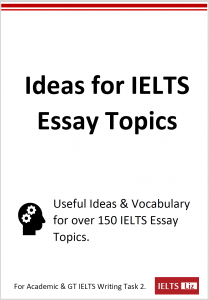A background statement is the first sentence of an IELTS essay. It is written to introduce the essay question by paraphrasing it. Below you will find an IELTS writing task 2 essay question with model background statements. Also watch the video lesson below to learn how to write an introduction properly.
Essay Question
GOVERNMENTS SHOULD NOT INVEST IN ARTS SUCH AS MUSIC AND THEATER. GOVERNMENTS MUST INVEST MORE IN PUBLIC SERVICES.
TO WHAT EXTENT DO YOU AGREE?
It is considered by many that government should spend more funds on public welfare rather than investing in art, for instance,music and theatre.
- article “the” – it should be written “the government”. Missing “the” and “a” from sentences is one of the most common grammar mistakes that students make.
- Public welfare is not the same as public services. Public services relate to public transport and the health system. However, public welfare relates to benefits for unemployed or sick people.
Model Background Statement
Some people think that the government should spend more money on public services instead of using their budget to support the arts, for instance theater and music.
Full introduction
One Sided Approach
Some people think that the government should spend more money on public services instead of using their budget to support the arts, for instance theater and music. In my opinion, I fully agree that money should be spent on public transport and the health system as it is a waste of resources to fund the arts. (56 words)
Balanced Approach
Some people think that the government should spend more money on public services instead of using their budget to support the arts, for instance theater and music. In my opinion, although more investment is needed in public transportation and the health system, the arts play an important role in society and should not be ignored. (55 words)
How to write an Introduction for IELTS Essays
Watch this video to learn how to write both a background statement and a thesis statement for an IELTS opinion essay.
[su_youtube url=”https://youtu.be/YngqHl_BLOU”]Main IELTS Pages
Develop your IELTS skills with tips, lessons, free videos and more.





